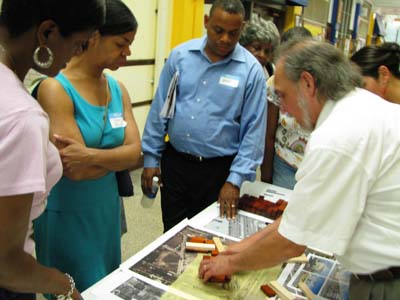MPC's Corridor Development Initiative helps engage residents in issues of density, design and development.
Are you looking for ways to proactively engage local residents in issues of density, design and development in your community?
If so, the Metropolitan Planning Council (MPC) is accepting applications now for its Corridor Development Initiative. MPC established the Corridor Development Initiative (CDI) in recognition of the fact that resident involvement is often a factor in development decisions only once a plan is being publicly reviewed - which all too often devolves into a negative, reactionary process. CDI is an innovative participatory planning process that allows communities to proactively plan for real world development scenarios. This three-part planning process helps residents understand issues such as density, affordable housing, architectural design, and the true cost of development. Through the CDI, the community develops a distinct set of development priorities that can guide community leaders as they plan for future development.
Integral to the CDI is the hands-on opportunity for residents to “build” what they would like to see on specific development sites and, with the help of a developer, instantly run the numbers to see if their project is financially feasible. Architects also are on site to sketch how the proposed development might look. The CDI process allows the community to consider various development options, as well as explore how their ideas might pan out on the ground.

How does the Corridor Development Initiative work?
The CDI process consists of three community meetings that occur two to three weeks apart. They are facilitated by MPC, the Chicago Metropolitan Agency for Planning, and a lead community-based organization or public official. A steering committee of invested community members helps lead the CDI process.
Before the community meetings, steering committee members convene to discuss development opportunities and challenges, identify specific parcels that have (re)development potential, and develop an outreach strategy that will connect as many community members as possible to the process. Steering committee members are responsible for helping to identify key issues, structure the agenda, and publicize the series of meetings.
The CDI team includes volunteers of experienced facilitators, architects, real estate experts and developers.
Meeting 1: Existing Conditions and Goal Setting
The objective of the first meeting is to provide an overview of current land use policies, demographics, and commercial issues in the community. Residents then have a chance to discuss some of the opportunities and challenges in (re)developing parcels in their community in order to identify key goals.
Meeting 2: Block Exercise
At the second meeting, community members explore economic and design options they would like to see in their community through a hands-on block exercise. Residents create hypothetical development options for three sites using wooden blocks that represent retail and housing units. As community members build their proposals, they are sketched by designer advisors stationed at each table, while a real estate advisor calculates development costs and revenues.
Meeting 3: Development Recommendations
The final meeting consists of a presentation of the block exercise results. A panel of real estate experts and/or developers responds to the outcomes in light of current market trends. There also is a facilitated discussion to reach a consensus on final development recommendations, which are compiled in a report community leaders can present to potential developers and include in RFQs and RFPs to offer a community-led vision.
Interested in learning more about CDI? Check out this seven-minute video that explains the process.
CDI's will be selected based on the following criteria:
- The process will help to support current planning efforts such as a new or recently updated comprehensive plan or corridor plan.
- There is existing community and government support.
- There are at least three sites along the corridor for the exercise, preferably some city or village owned.
- The community has a realistic opportunity for development.
In addition, MPC will look for organizations that have demonstrated leadership and staff capability to follow through with the recommendations developed by the CDI.